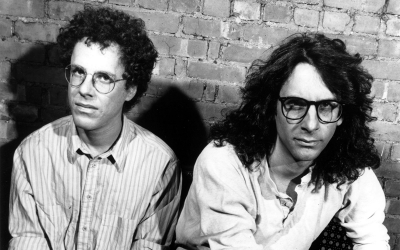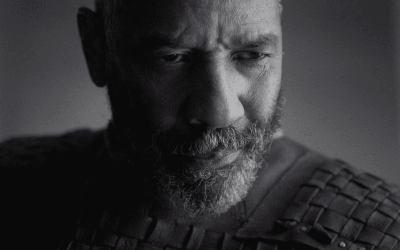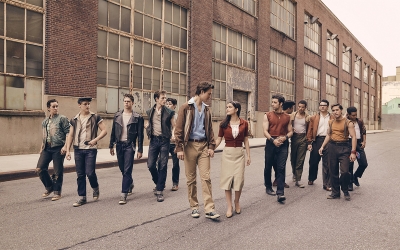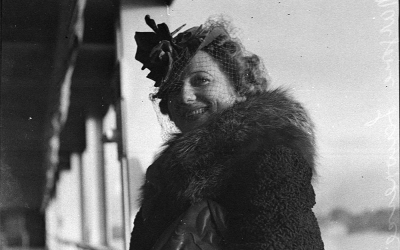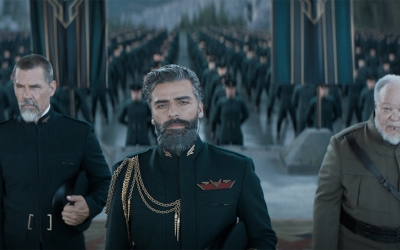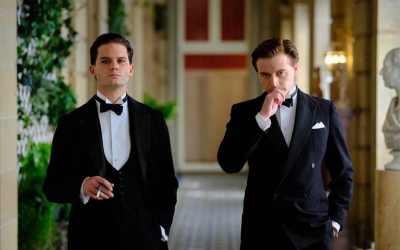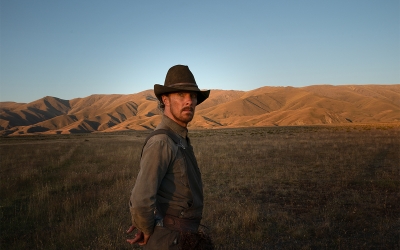Film
They have always been inseparable in the public imagination, the Coen brothers, a zygotic artistic collaboration with an almost primal indivisibility. While for years Joel was credited as director and Ethan as producer, this was due entirely to a quirk in the Directors Guild of America that disallowed duel directorial credits, unless members were an ‘established duo’. This became official in 2004: they are now the established duo of commercial film – one would have to go back to Powell and Pressburger to find a cinematic partnership of such richness and breadth. With the release of Joel’s The Tragedy of Macbeth, the first film directed solely by one brother, it seems a good time to drill down into the brothers’ quintessence: what is a Coen brothers’ film, and what could or should we expect from a Coen brothers film? Is the zygote finally subdividing?
... (read more)Could Macbeth be Shakespeare’s most innately cinematic play? Even in its brief stage directions and off-stage action, it conjures up daring battlefields, horrible massacres, spine-tingling witchcraft, wandering spirits, duels on castle ramparts, and a moveable forest. Every few years another filmmaker tries their hand at it, Orson Welles (Macbeth, 1948), Akira Kurosawa (Throne of Blood, 1957), and Roman Polanski (Macbeth, 1971) notable among them. 2006 gave us Geoffrey Wright’s best-forgotten Dunsinane-does-Underbelly version, while Justin Kurzel (director of Snowtown and the recent Nitram) injected his terrific 2015 version with rousing battle sequences and a blockbuster-ready, musclebound Thane of Glamis. Now, not long after Kurzel’s film, comes The Tragedy of Macbeth from Joel Coen, working without his brother Ethan for the first time in decades. Where Kurzel’s version aimed for historical realism and cinematic virtuosity, Coen’s adaptation is faithful above all else to Macbeth’s original medium: the theatre.
... (read more)Steven Spielberg obviously relishes challenges. Tackling, at this late stage in his career, his first musical is challenge enough, but directing a remake of one of the most iconic filmed musicals since the talkies arrived might be considered a mixture of chutzpah and lunacy. Luckily, the result is, mostly, a successful mixture of hommage and re-evaluation.
... (read more)Say the words ‘Australian opera singer’ and most people, if any names were to surface at all, would nominate Nellie Melba or Joan Sutherland. But for a country with a small population, Australia, since Melba’s début in 1887 at the Theatre Royal de la Monnaie in Brussels, has consistently punched above its weight in the production of successful classical singers. In the 1950s and 1960s, both Covent Garden and London’s alternative opera company, Sadler’s Wells, were studded with Australian singers, while in Paris, Menindee-born Lance Ingram, under the name Albert Lance, was for many years a leading tenor at the Paris Opera, partnering Maria Callas, among many others. Today singers such as Stuart Skelton and Nicole Car have major careers only slightly curtailed (one hopes) by the wretched virus.
... (read more)For decades, Frank Herbert’s epic science fiction novel Dune (1965) was generally regarded as unfilmable, a literary work that defied transposition into another artistic medium. Never one to balk at a challenge, David Lynch embarked on his own adaptation of Dune in 1984. With neither the majesty of Stanley Kubrick’s 2001: A Space Odyssey (1968) nor the commercial appeal of the Star Wars franchise, Lynch’s version largely faded into obscurity, though it has since become something of a cult film. Before Lynch, experimental Chilean filmmaker Alejandro Jodorowsky had, according to Frank Pavich’s documentary Jodorowsky’s Dune (2013), planned a ten- to fourteen-hour production, starring Salvador Dalí, Orson Welles, and Mick Jagger, among others. That project was, unsurprisingly, abandoned; we are left to ruminate on what might have been.
... (read more)In Cantonese theatre, bamboo structures have been used for more than a century. Cathedrals of bamboo, shocking in their scale and intricacy, shelter spaces in which art, culture, and religion flourish. These theatres are temporary, existing often for less than two months before they are taken apart and removed. They require no nails; instead, they are bound by bits of black twine and stand upright as if by magic. It’s a dangerous practice. While bamboo scaffolding remains ubiquitous in Hong Kong, it’s been mostly banned in China due to safety concerns.
... (read more)Devotees of Wes Anderson know what to expect, and they certainly get it in spades in The French Dispatch. Those who sensed that the American director lost his way with The Grand Budapest Hotel (2014), may feel he has strayed even further from the simplicity of the works that made him famous, such as the understated Bottle Rocket (1996), the quirky and endearing Rushmore (1998), and that masterpiece of whimsy, The Royal Tenenbaums (2001). The Grand Budapest Hotel, Anderson’s homage to Stefan Zweig set in a European alpine resort, has much in common with his latest film; an episodic, phantasmagorical, excessive, and, at times, indulgent work. It met with mixed reviews and was described as ‘kitschy’ and ‘curiously weightless’, epithets which might apply equally to his The French Dispatch, largely for its overlong zany scenes which appear arbitrary in relation to the action.
... (read more)Cinema and poetry make for a less obvious coupling than cinema and theatre or cinema and painting, but once you start counting, the number of movies about poets and their world is surprisingly high. Granted, there’s more about scandal than scansion in most of them, but the list, just from those I remember seeing, is impressive: The Barretts of Wimpole Street (1934), The Bad Lord Byron (1949), Stevie (1978), Gothic (1986), Barfly (1987), D’Annunzio (1987), Tom & Viv (1994), Total Eclipse (1995), Sylvia (2003), and Bright Star (2009). Within only the past five years we’ve been treated to Neruda, Dominion or the alternatively named Last Call (about the final hours of Dylan Thomas), Mary Shelley (which, like Gothic, ropes in Byron as well as the title character’s poet–spouse, with Coleridge added to the mix), and two bardic biopics from director Terence Davies: A Quiet Passion (2016) and the newly released Benediction. Might Davies, you wonder, be planning a third such venture, to match his acclaimed semi-autobiographical trilogy about working-class life in Liverpool from the 1940s to the 1960s?
... (read more)After eighteen months of wayward blockbusters and couch-ready, pandemical streaming entertainment, Jane Campion’s The Power of the Dog arrives like a stiff shot of pure cinema. Adapted from Thomas Savage’s 1967 book of the same name, Campion’s film offers no quick thrills, no easy answers, no simple heroes, and no mercy for its inhabitants. It’s a rare beast in an industry increasingly split between shoestring-budget genre films and $200 million franchise toppers; a quintessential adult drama.
... (read more)Dean Gibson, a Guugu Yimithirr man, is the writer and director of Incarceration Nation, one of the latest documentaries on SBS On Demand. It’s worth noting this because Incarceration Nation, for those who believe this country was ‘settled’ and is equal for all, is essential viewing. Gibson says that ‘Australia was founded by the English with one clear purpose: to create a prison island. More than two hundred years later, not much has changed.’ It’s a strong statement. Having written about this before, I would take it one step further and say that Australia was founded to create not a prison, but an economy.
... (read more)

